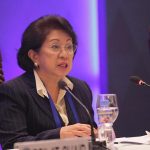President Rodrigo Duterte has been quite vocal lately about his plan to appoint barangay officials to stop narcopolitics. This move was supported by Surigao del Norte Representative Robert Ace Barbers, who filed House Bill 5359 on March 28, seeking to postpone the barangay and Sangguniang Kabataan elections set for October 2017 to May 2020.
Barbers’ bill wants to terminate all incumbent officials upon the legislation’s effectivity and allow Duterte to appoint “officers-in-charge” (OICs) to fill barangay posts. He explained his bill like this:
[ads2]
“President Duterte said that he wants the October 2017 barangay elections postponed because he does not want those financed by drug lords to win. He further said that if the barangay elections would proceed as planned, the winners might be financed by drug money.”
Writing for Rappler, election lawyer Emil Marañon III took note of how Barbers’ bill carefully used “officers-in-charge” instead of appointed punong barangay to hopefully “deflect legal complications.” He added that regardless of its wording, the bill seeks to give Duterte the power to pick and appoint punong barangays instead of having them elected.
Marañon said that this is unconstitutional on at least five fronts:
- The 1987 Constitution mandates that local government positions, which include barangay posts, must be filled by election. There may be no straightforward declaration, but Marañon the intention is clear in the following provisions:
- Article IX (C) Section 2.2: Exercise exclusive original jurisdiction…and appellate jurisdiction over all contests…involving elective barangay officials decided by trial courts of limited jurisdiction.
- Article X, Section 8: The term of office of elective local officials, except barangay officials, which shall be determined by law, shall be three years and no such official shall serve for more than three consecutive terms. Voluntary renunciation of the office for any length of time shall not be considered as an interruption in the continuity of his service for the full term for which he was elected.
- To make barangay officials appointive instead of elective, a constitutional amendment is necessary, not a legislative enactment.
- Article X, Section 8 states that Congress can only change the length of the terms of office of barangay officials, which means they can only decide on whether to extend or shorten the current three-year term for the said positions.
- Appointing barangay officials is a “threat” to the Constitution’s aim to provide decentralization. Article II, Section 25 states that the country should “ensure the autonomy of local governments.” Article X, Section 4 also pointed out that the President “shall exercise general supervision over local governments.”
[ads1]
Marañon explained that this provision granted supervisory powers to the President, but also limits the central government’s meddling with the local government. He said that Barber’s House Bill 5359 aimed not expand the President’s authority beyond general supervision. Marañon added that it also gives Duterte the power to fire the same barangay officials that he appointed as well.
“Putting all barangay officials at the full mercy of the President is clearly beyond even the most liberal interpretation of “general supervision,” Marañon wrote.
“If we go further, following Representative Barbers’ and President Duterte’s logic, what is there to stop them from expanding the scheme to higher local government posts and have all of them simply appointed? None,” he added.
Marañon also expressed his concern over just how dangerous this bill could be as it will “put too much power in one person.”
“This is a dangerous precedent as it would not only effectively lump the supposedly decentralized local governments to the executive department, but will put too much power in one person, the dangers of which this country is too familiar with,” he wrote.
- Duterte’s plan and Barbers’ bill to appoint barangay officials is a “direct assault” on democracy. The power to choose barangay officials should be in the hands of the people.
Article II, Section 1 states that “[s]overeignty resides in the people and all government authority emanates from them,” Marañon said.
“House Bill 5359 is an attempt of Congress to wrestle this remaining sovereignty from the people. Unfortunately, this power is not for Congress to give to the President, for the simple reason that it cannot give what it does not have in the first place,” he concluded.
Marañon served as chief of staff of former Commission on Elections Chairman Sixto Brillantes Jr.
Sources: ( rappler.com , cnnphilippines.com )
[ads3]


